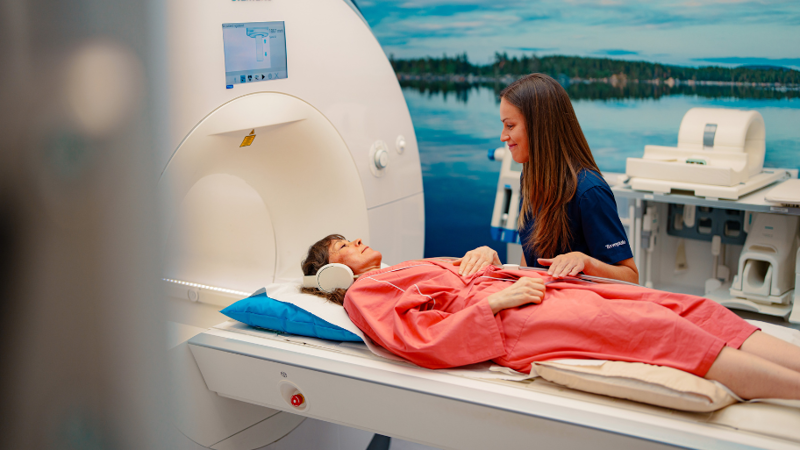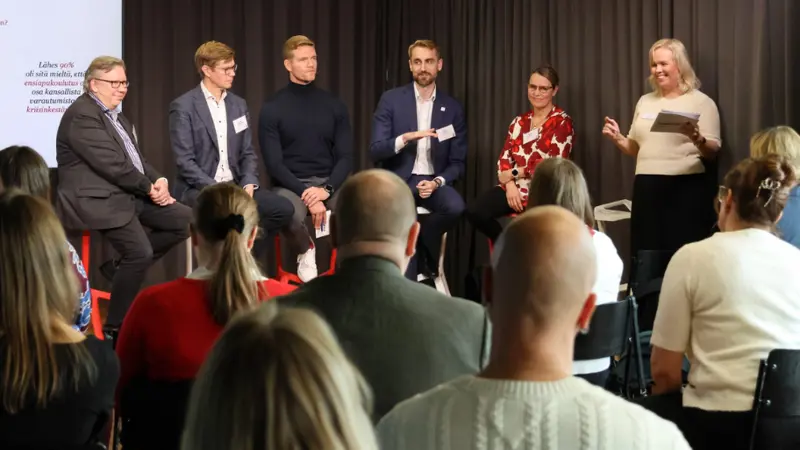How to get the energy drains of the workplace under control
Terveystalo's Terve Työpaikka barometer, conducted in spring 2023, surveyed the state of Finnish working life and the ability of organisations to respond to the changing world of work. Almost 80% of the respondents agreed that Finnish working life is becoming more fast-paced and stressful. For most people, the longer summer holiday period is a good time to recover from the strain, but if the pace of work is not sustainable, batteries will quickly run down. Outi Ikonen and Jaakko Sahimaa, organisational psychologists at Terveystalo, call for humanely efficient management skills in organisations so that Finland, which is suffering from a labour shortage, can manage to look after the working age population's ability to work.

Terveystalo's Terve Työpaikka barometer responses show a clear contrast between top management and the front-line level, with top management perceiving Finnish working life as more humane and less stressful than that of HR management, front-line employees or those in other roles.
– At the same time as we talk about the humanity of working life, many employees feel that results are taken off people's backs. Such differences of opinion are energy-draining and should be addressed, as no employer can afford to lose talent or risk the working capacity of their own staff, says Outi Ikonen, Leading Organisational Psychologist at Terveystalo.
After a restorative holiday, everyone should be ful of energy. The approach is often very individual centered and the responsibility for recharging the batteries, for an efficient employee who can cope in the autumn, lies on the shoulders of the individual. But the fact is that if everything is not right in the work community, the strain quickly eats away at your ability to cope. According to organisational psychologist Jaakko Sahimaa, the fact that the batteries are flat does not necessarily mean that the holiday was bad, but that there are energy drains in the work community that should be addressed through management.
– These energy wasters include dysfunctional work processes or systems that make people frustrated when time is spent dealing with repeated errors and communication breakdowns. Unclear roles and responsibilities that cause colleagues to step on each other's toes, conflicts and missed tasks are also examples of structural energy saps, says Ikonen.
From rest to full speed or gradually increasing the workload?
In today's world, the fragmentation of work, the fact that the framework of work does not allow for sufficient concentration on tasks that require concentration, and the intense pace of workdays, can quickly drain the batteries.
– A common mistake is to think that everyone is rested now, and then go full speed ahead. This can be the case, but on the other hand, if problems have been identified in the work community before the holiday, they have not usually disappeared during the holiday, Ikonen points out.
Energy drains occur when there is not enough time to develop work and the work community together. In all teams and at all levels of the organization, it is important to regularly review what works and what does not. After returning from holiday, it is a good time to jointly assess and prioritize what needs to be focused on and what needs to be improved.
– Even at the individual level, it is useful to prioritise in a refreshed state of mind, so this can also be thought to be the case at the team and organisational level. Think together about what you could be doing smarter to make your work more humanly efficient and sustainable, Sahimaa says.
Recognize, accept, and utilize tensions
Human needs and organizational dynamics therefore need to be better integrated into organizational development to build a sustainable working life. This requires that the tensions between humanity and business are recognized and accepted in management and organizational activities.
– Managers must be able to commit to a consistent approach that does not divide between a hard style that emphasizes efficiency and a soft style that emphasizes humanity. Both are needed simultaneously, not randomly and inconsistently. When these sometimes conflicting objectives and values are openly discussed within the work community and solutions are found together to reconcile them, management becomes predictable and supportive of people's well-being. Staff don't have to think about which way the wind is blowing at any given time, says Ikonen.
Terve Työpaikka barometer is an online panel conducted by Terveystalo in spring 2023 to survey the state of Finnish working life, the ability of organizations’ to respond to changing working life and the role of occupational health in working life. The panel was answered by 736 business decision-makers.
Read more occupational health articles

Terveystalo's digital services have been awarded the internationally recognized ISO27001 information security certification.
Terveystalo's information security practices, processes, and risk management are in line with international best practices.

Does massage help relieve stress? – Touch restores and calms the body and mind
Stress is not always visible on the outside, but the body does show signs when the strain increases. According to Lassi Ylönen, a trained massage therapist at Terveystalo Rela, the body often communicates stress through subtle signs.

Circular economy and artificial intelligence boost performance and improve care
At the heart of sustainable healthcare, technology serves as a tool for improving both the quality of care and accountability. Terveystalo favors solutions that combine sustainability, cost-effectiveness, and medical expertise.

Psychologist: How to make Christmas a relaxed and personal celebration
For many, the anticipation of Christmas begins when cities are decked out in seasonal lights and the first chocolates, calendars, and gingerbread cookies appear on store shelves. Christmas carols ring out and the Tonttuparaati choir sings “Kiire jo on! Kiire jo on!” (Hurry up! Hurry up!). This warm and atmospheric celebration also brings other feelings to mind: how on earth can we get through all this without losing our joy and peace in the rush?

Terveystalo and Gosta Labs deepen their cooperation: the goal is to streamline work with a superior patient information system
Terveystalo is deepening its cooperation with Finnish health technology company Gosta Labs and investing €1 million in the company as a minority investor. The aim is to jointly develop artificial intelligence solutions that improve the quality of care and the efficiency of reception work as part of Terveystalo's new patient information system, Terveystalo Ella.

First aid preparedness in companies requires action and courage
First aid skills increase resilience, but a barometer survey of Finnish organizations' first aid capabilities published in October reveals that the number of trained personnel is alarmingly low.